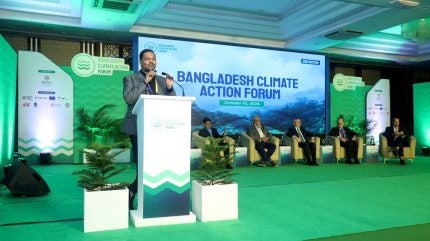
Uddin told the 450 international delegates at the apparel climate action event, which took place at the Radisson Blu Water Garden Hotel in Dhaka, that everyone wants to eliminate poverty and the disasters facing Bangladesh.
He explained that cheap labour is no longer a competitive advantage for the country, however “if we as entrepreneurs do not achieve the [sustainable] target set by our clients, we will not be able to succeed”.
To achieve the targets, Uddin said apparel manufacturers “need more shared responsibility, collaboration, and support”.
The overarching theme was ‘driving collective climate action’ with the forum featuring keynote addresses, panel discussions and presentations to act as a catalyst for dialogue and collaboration among various stakeholders.
The forum featured an engineering workshop with over 300 engineers from apparel manufacturing units gaining practical strategies to drive sustainability and decarbonisation efforts within their organisations.
It also introduced two new initiatives – the Soldiered ‘Better Mills Initiative’ and the OnetrueSOLar Fund. Plus, it featured presentations exploring solar rooftop system optimisation, thermal energy system optimisation and how to be clean by design.
Bangladesh adviser to the Ministry of Power, Energy, and Mineral Resources, Dr. M. Fouzul Kabir Khan told attendees during the opening plenary: “Our renewable energy penetration is low – 2%; we want to move it upwards. We are moving on to larger systems with higher sustainability capacities. I hope you will join us in the journey to sustainability and take the country forward.”
Bangladesh’s chief advisor’s Special Envoy for International Affairs Lutfey Siddiqi agreed, adding: “As entrepreneurs and as businesses, it matters how we produce things. Not just what we produce at the cheapest cost.
“Climate transition is a real risk that we need to be mindful of. We should not treat it as a compliance issue but a proper business strategy issue where we can stand out as the superior standard.”
While the ambassador and head of delegation of the European Union to Bangladesh Michael Miller was keen to point out there is a shared obligation to act. He said: “Global gateway aims to mobilise up to €300bn ($328.52bn) of public and private investments by 2027 through a combination of grants, concessional loans, and guarantees to de-risk investments.”
Key partners supporting the forum included the Apparel Impact Institute, Cascale, the European Union, GIZ, H&M, the Embassy of the Netherlands in Bangladesh, PDS Limited, and Target theme was ‘driving collective climate action.
It also featured the Ministry of Foreign Affairs; Ministry of Power, Energy, and Mineral Resources; Ministry of Environment, Forest and Climate Change; the Bangladesh Power Management Institute (BPMI), the Embassy of Denmark in Bangladesh, the Embassy of France in Bangladesh, the Embassy of Sweden in Bangladesh, ILO, Laudes Foundation, Oxfam in Bangladesh USAID Bangladesh.



